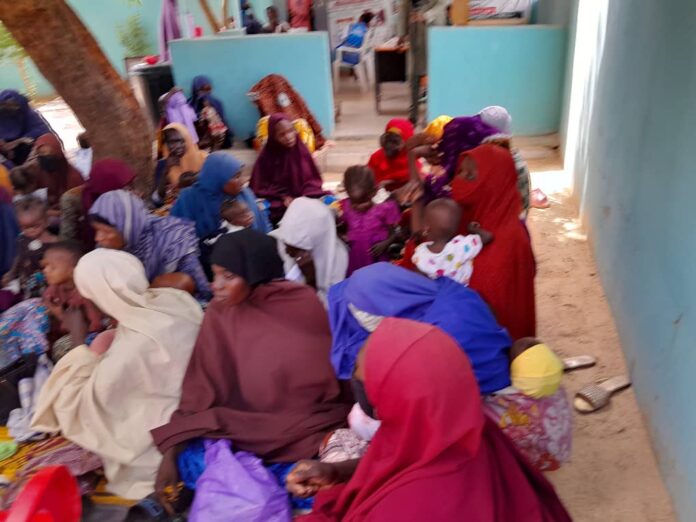……. Borno Women Embrace Family Planning for a Healthier Future
By Babagana Bukar Wakil, Maiduguri
More than 200 women, many of them pregnant or breastfeeding, participated in a recent outreach programme on childbirth spacing and family planning at the GRA Primary Health Care Clinic in Gwange III Ward, Maiduguri, Borno State.
The initiative, supported by The Challenge Initiative (TCI), focused on raising awareness and improving access to reproductive health services for women displaced by insurgency. A documentary shown during the event illustrated the life-saving impact of family planning, highlighting its role in reducing maternal mortality and strengthening family wellbeing.
During an interactive session, health educator Malama Hadiza Garba introduced participants to a variety of contraceptive methods ranging from oral pills and injectables to implants, intrauterine devices, condoms, and natural alternatives. She stressed that informed decisions on family planning not only enhance maternal and child health but also help families build resilience in the face of economic hardship.
The session prompted deep engagement. Many women voiced personal concerns and sought guidance on the options available to them. For those reluctant to speak openly, Malama Hadiza offered private follow-up counseling, affirming that reproductive health decisions are personal, confidential, and empowering. Her core message: family planning is not just a service, it is a right.
In a separate session, Senior Community Health Extension Worker Aisha Muhammed addressed expectant mothers and their partners. She encouraged couples to make joint decisions about reproductive health, explaining that male involvement leads to better health outcomes for women and children.
Among the many personal stories shared, one of the most striking came from 21-year-old Zara Botulbe, displaced from Marte Local Government Area and now living in Maiduguri. She revealed that she had given birth to three children within just two years.
“Two of my children are often ill, and I’m not feeling well myself. I was told it’s because I had them too close together,” she said. “Now that I understand more, I want to plan better for my health and for my children’s future.”
Zara’s experience reflects a broader reality for many displaced women in Borno. Years of insurgency have crippled access to healthcare, especially for those in remote communities. Many young mothers face high risks of maternal complications, poor nutrition, and little knowledge of safe birth spacing.
Simon Malgue, an internally displaced person from Askira Uba, attended the event with his wife. He said the economic realities of raising children without a plan had pushed them to seek guidance. “We now know how family planning can help us give our children a better future,” he noted.
Also present was 65-year-old Hajja Maryam, who brought her recently married daughter already expecting another child just 15 months after her previous delivery. “I want her to learn what I didn’t. She’s too young and too weak to go through this again so soon,” she said.
Aisha Sale Yerima, another participant, shared that it was her husband who encouraged her to attend. “We’re already struggling financially. We can’t keep expanding our family without a plan. It’s time to make the right choice for our future,” she said.
Healthcare providers at the event reiterated that family planning should be viewed not as a burden on women but as a collective responsibility. They provided counseling and access to various contraceptive methods, stressing the importance of support from men and community leaders, especially in rebuilding post-conflict societies.
Though challenges persist such as cultural stigma, misinformation, and lack of male involvement, health workers noted signs of growing acceptance. Displaced families are beginning to embrace reproductive health education and services, recognizing their role in building healthier, more resilient futures.
While displacement has deepened the vulnerability of thousands of women to unplanned pregnancies and related risks, interventions like those supported by TCI and community-based efforts by organizations like DevCom are creating a shift. Slowly but steadily, awareness is rising. And with it, hope for stronger families, healthier mothers, and brighter futures in Borno State. End




